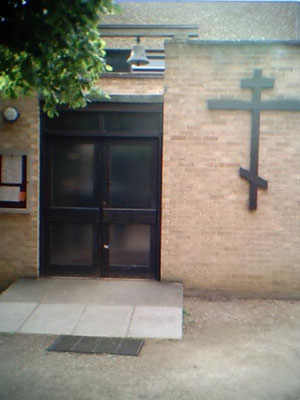 |
|

The church: Church of the Holy Trinity, Oxford, England.
Denomination: Greek Orthodox.
The building: This is a new building made of brick, but has all the essential features of an Orthodox church: an array of icons, lots of candles and an icon screen.
The church: The building is shared by the Russian Orthodox Church of the Annunciation. The congregation at this service was mixed and contained a range of ages.
The neighbourhood: The church is in leafy north Oxford. Surrounded by housing, cosy pubs and some university sprawl, it's a very pleasant area. No traffic noise to speak of.
The cast: Not announced, but looking at the list of clergy outside, I'm guessing the president was Fr. Ian Graham. He had three singers helping him and another man who may have been either a server or a deacon.
Feast of Saints Peter and Paul – Vespers, Matins and Liturgy.
How full was the building?
It varied, people kept coming in and out. Probably an average of about a dozen, but almost 50 made it for the communion.
Did anyone welcome you personally?
I was the first there (the Orthodox don't seem to do arriving early), so the first thing that was said to me was, "is it open yet?" The answer was, "no."
Was your pew comfortable?
No pew! People spent most of the service standing, with a small kneeling section. There were seats provided for those who required them, but I didn't try them.
How would you describe the pre-service atmosphere?
It was hard to tell what was pre-service. People were lighting oil lamps and candles and chanting pretty much from when the doors opened and continued doing this (and clearing away dead candles) throughout. There was no chatter.
What were the exact opening words of the service?
Not sure, as they were in Greek. The first words I understood (about five minutes in) were kyrie eleison ("Lord, have mercy").
What books did the congregation use during the service?
None (except the singers and priest). Some of the congregation had brought their own. The service was all in Greek, but the readings, creed, Lord's Prayer and some of the other prayers were repeated in English. I have studied New Testament Greek, but found it rather hard to keep up at times. Annoyingly, the bits that were repeated in English were the bits I could best understand. A few service books in English for visitors might have been helpful.
What musical instruments were played?
None. The singers had good enough pitch not to need tuning forks.
Did anything distract you?
Trying to follow the Greek. I would probably have been better off at a Russian service, where I would have understood nothing, because I could sometimes get the gist of the Greek and got annoyed at not being able to follow it fully. Also, we were censed with the thurible in the "open" position (or that's what it looked like to this Anglo-Catholic sometime thurifer), which was slightly scary.
Was the worship stiff-upper-lip, happy clappy, or what?
Neither! It was heartfelt, emotional and emotive worship. An ancient liturgy which was given life.
Exactly how long was the sermon?
No sermon, but the priest did take a catachumen aside after one of the Gospel readings and, I suppose, instruct him.
Which part of the service was like being in heaven?
Being censed: in a service in which I understood little, this was a powerful non-verbal way for the priest to convey his blessing to me. Also, the realization of how much these people hungered for God's mercy and how they loved his glory and power: so much kyrie eleison and doxa and axios – and all of it sincerely meant.
And which part was like being in... er... the other place?
I was disappointed there was no sermon. Also, I would probably have got more out of the service if I'd been given a book, even one in Greek. I was very sad not to be able to join in the hymns, for example.
What happened when you hung around after the service looking lost?
The service ended with everyone walking past the priest and kissing his crucifix as he wished them "Happy feast!" and the deacon/server then giving them the antidoron (blessed, but not consecrated, bread). I was unsure whether I was meant to do this, too, but a lady walked up and gave me a small piece of her antidoron, which gave me the confidence to go up. People then stayed and chatted and I hung around, looking at the icons. No one came and talked to me, but the lady who had given me the bread had displayed a greater sign of welcome than I could have hoped for.
How would you describe the after-service coffee?
There was none.
How would you feel about making this church your regular (where 10 = ecstatic, 0 = terminal)?
5 – Not being Orthodox, I couldn't make this my "home church", but if it wasn't for the fact that I'll soon be leaving Oxford, I'd definitely come back for mid-week services. The reverence and passion were inspiring.
Did the service make you feel glad to be a Christian?
Yes. I look forward to worshipping with greater understanding with these people in the Eternal City.
What one thing will you remember about all this in seven days' time?
The haunting kyrie chant, and the hunger behind it.
| The Mystery Worshipper is sponsored by surefish.co.uk, the internet service provider from Christian Aid. By offering email services, special offers with companies such as amazon.co.uk and smile.co.uk, surefish raises more than £300,000 a year for Christian Aid's work around the world. Click here to find out how to become a Mystery Worshipper. And click here if you would like to reproduce this report in your church magazine or website. Top | Other Reports | Become a Mystery Worshipper! © Ship of Fools 2004 |